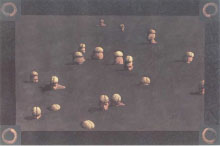Event Details

Cooperative Event
The Human Brain and the Social Bond: Exploring the Notion of Constrained Relativism
2010-09-03 0:00 - 2010-09-04 0:00
Konrad Lorenz Institute for Evolution and Cognition Research (KLI) and the International Institute for Applied Systems Analysis (IIASA)
Organized by Michael Thompson, Robert Turner and Marco Verweij
Contra the founding fathers of social thought (e.g., Maine, Tönnies, Durkheim), all of whom had dualistic schemes (e.g., status/contract, Gemeinschaft/Gesellschaft, mechanical solidarity/organic solidarity), theorists of institutions now routinely invoke three (or four or five) different ways in which we bind ourselves to one another and, in so doing, determine our relationship with nature. In other words, at least one more way of interacting has been added to the classic markets-and-hierarchies distinction: community, for example, or clans or collegiums or bonding social capital or cliques or (going back to Max Weber) charisma.
In this sort of institutional approach, it is the way of organizing, perceiving and justifying social relations that is the unit of analysis, not the individual. Indeed, it makes more sense to speak of ´the dividual´, since a psycho-physiological entity may be expected to move in and out of different ways of organizing and perceiving in different areas of his or her life: workplace and home, for instance. Also, in going from two to three (or four or five) institutional forms, these theorists have taken social systems from simplicity to complexity (as in ´two’s company, three’s complexity´).
What is very important for this ´plural rationality´ approach is that the sorts of neurological processes it requires of the psycho-physiological entity (for instance, that he or she be able to internalize each of these rationalities, and then be able to switch from one to another in response to appropriate cues) not be physiologically impossible.
Neuroscientists, are quite comfortable with this plural rationality framing. It is the uni-rationality required by rational choice theory, and the other extreme (in which rationalities proliferate towards infinity) required by postmodernism, that they have difficulty with. We can hypothesise that, if this sort of plurality is possible, perhaps it is compulsory!
The way would then be open for a new sort of social science that would bring together students of the social bond and students of the human brain, but in a way that (unlike sociobiology) is not at all reductionist. Indeed, the way is already open, in the sense that researchers from both sides of the natural science/social science divide have been finding their independent ways to this sort of “constrained relativism” framing.
Bringing all the work together raises a number of large questions, among which are:
• What are the precise neurological processes that underlie the notion of constrained relativism (i.e., the idea that a limited number of “elementary” ways of organizing, perceiving and justifying social relations –or institutions– exist)?
• What are the institutional patterns that we find, spread out across both time and space, in both animal and human life? And are these the same patterns?
• Do these institutional patterns emerge in opposition to one another (i.e., is each one’s viability dependent on the presence of the others)?
• At what stage in their lives, and by what sort of developmental processes, do human beings internalize alternative ways of perceiving and behaving?
• Does the notion of constrained relativism solve any outstanding ethical problems?
• What are the implications for decision-making generally, and for governance in particular?
The aim of the proposed workshop is to start answering these questions.


